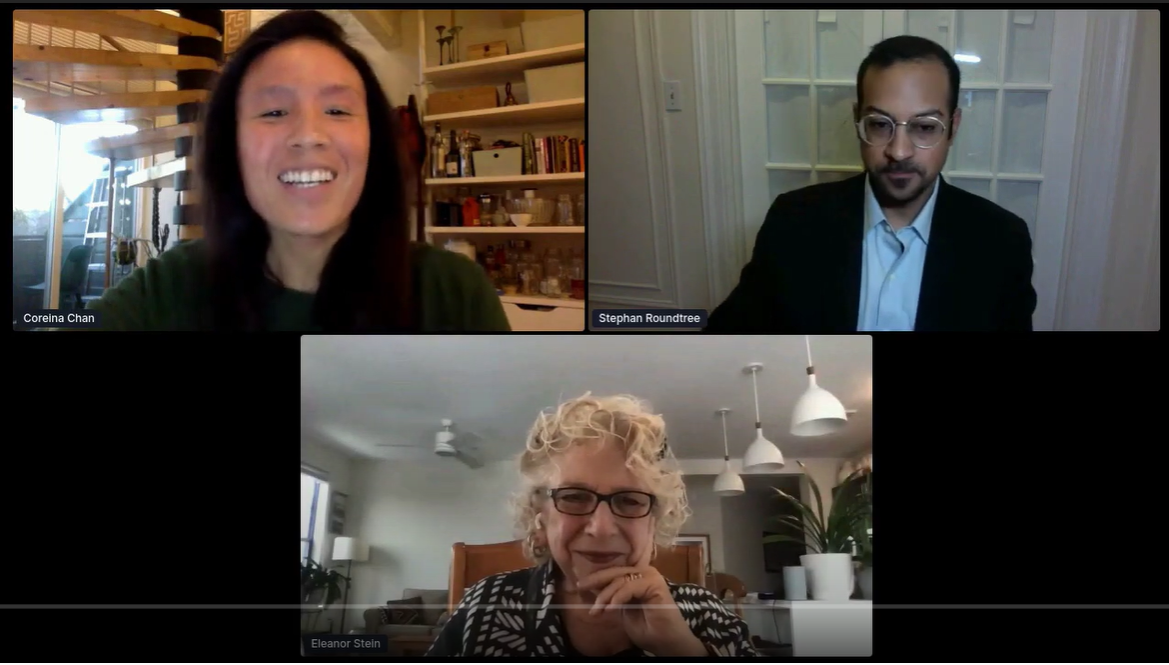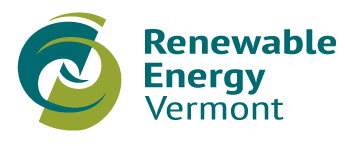In December 2019, REV was delighted to co-host with VECAN (the Vermont Energy & Climate Action Network) the fourth and final session of our fall conference series. The day’s events focused on building equity in our energy systems and in our economic recovery efforts. Low- and moderate-income communities and communities of color are much less likely to have access to the benefits of clean energy and much more likely to experience negative consequences from climate change. It is incumbent on all of us in the clean energy space to work to ensure that the clean energy transition doesn’t recreate existing socioeconomic inequities, but instead helps create a world where resources are shared

Plenary Panel featuring clockwise from top left Coreina Chan, Stephan Roundtree, and Eleanor Stein.
more justly.
The plenary conversation featured speakers Coreina Chan of the Rocky Mountain Institute, Stephan Roundtree of Vote Solar and Eleanor Stein of Albany Law School who focused their discussion on the importance of bringing an equity lens to decision-making and regulatory processes. Watch their full conversation here or read ahead for some of the key questions and takeaways:
- How would the development of energy regulation and policy look different if we were working on energy with an equity lens?
- We would first make a commitment to prioritizing equity. We are in the midst of a climate crisis so we tend to focus on speed and scale, but we must also focus on equity.
- We would anchor solutions in affected communities because people and communities know best what they need. We must look at the inputs that inform decisions and ensure that relevant data and experience come from the people who are most affected.
- Why is it so important to focus on disadvantaged communities?
- We simply will not solve the climate crisis if everyone is not included. Equity strives to understand what it will take to ensure that everyone has access to the benefits of clean energy.
- Equity benefits not only disadvantaged populations, but everyone in society. If you focus on helping people who are the furthest behind, you wind up developing policy that benefits everyone.
- Is there one model or approach that can work to ensure the development of equitable policies?
- Co-design is a promising approach because it recognizes that communities understand the problems they face and that their input is essential to generating creative solutions.
- How can we make co-design and other approaches to equity as effective as possible?
- Commit to achieving equity in all policymaking.
- Set aside time to bring in more voices and begin soliciting input far ahead of the regulatory deadline.
- Look for opportunities to utilize one’s status to amplify the voices of more marginalized groups and participants.
- Learn skills such as listening and meeting facilitation that may be required to engage new stakeholders effectively.
- Facilitate community participation by compensating participants, providing childcare, and scheduling meetings outside regular work hours.
- Engage in foundational education for all participants so that regulators and community stakeholders understand each other’s language and perspectives.
- Define terms and expectations ahead of time.

Spark Discussion Panel: Equity and Recovery

In the Spark Discussion Panel, speakers shared concrete examples of equity in research, policymaking and program implementation. Panelists included: moderator Sue Minter, Executive Director Capstone Community Action; Kelly Lucci, Director of Partner and Customer Engagement at VEIC; Michael DiRamio, Assistant Director of Energy Affordability and Equity at NYSERDA; Darren Springer, General Manager, and Jennifer Green, Sustainability Coordinator, of the Burlington Electric Department; and Eugenia Gibbons, Director of Climate Policy at Health Care Without Harm and Co-Chair of the Massachusetts Climate Council’s Climate Justice Working Group. Watch the full panel discussion here or read below for some key takeaways:
- Sue Minter, Capstone Community Action
- Can track growing economic disparities in Vermont by looking at food insecurity. Before the pandemic, 1 in 10 Vermonters were considered ‘food-insecure’. Six months ago it was 1 in 4. Now it is 1 in 3.
- Capstone’s Mileage Smart program provides incentives to income-eligible Vermonters for the purchase of high-mileage vehicles.
- Kelly Lucci, VEIC
- VEIC research clearly shows that LMI communities and communities of color in Vermont experience disproportionate effects of climate change. A cleaner energy system is an effective lever for reducing inequality, but unless we design our programs with existing inequities in mind, we will not succeed in addressing climate change because many people will be left out.
- Data on energy burdens in Vermont show clear trends: statewide average energy burden is 10%, but it ranges from 6% to 20%. Some Vermont households spend 20% of their income on energy. High energy burden does not correlate to higher energy consumption. In fact, places where energy burdens are highest tend to spend less than average.
- Targeted investments in incentive programs drive behavior. When Efficiency Vermont increased weatherization incentives for moderate-income households, participation of this segment increased from 30% in 2019 to 55% in 2020.
- Michael DiRamio, NYSERDA
- Climate Leadership and Community Protection Act: calls for carbon neutrality across the economy by 2050 with 40% of the benefits going to disadvantaged communities. Currently working with representatives of marginalized communities to develop a shared definition of ‘disadvantaged communities’ to ensure that the communities with the most to gain from the clean energy economy reap a minimum of 40% of the benefits. Read about the equity provisions in this act.
- Efforts to increase equity include the Climate Action Council which is comprised of 11 state agencies plus non-state actors working to develop an equity action plan for the state of NY and advisory panels focused on specific program areas.
- The Energy Affordability Program places a 6% cap on energy burden ensuring that no NY household exceeds this level. Paired with funding for increased efficiency measures and increased deployment of renewables, both of which reduce energy burdens.
- Jennifer Green and Darren Springer, Burlington Electric Department
- BED is part of Burlington-wide effort to examine racial disparities and address them. They are building on previous work by the city that resulted in A Guidebook on Equitable Clean Energy Program Design for Local Governments and Partners. They have also integrated equity into the utility’s strategic plan as both a moral imperative and a practical recognition that we cannot achieve net-zero unless all customers are involved.
- BED currently utilizes four key definitions of equity: 1) procedural equity—authentic engagement in programming; 2) distributional equity—prioritize those with the highest need; 3) structural equity—institutional accountability, always keeping in mind the ways that structural disadvantages are built into existing systems; 4) generational equity—our moral obligation to avoid placing unequal impacts on future generations
- BED embarked on Equity Foundations Training for leadership and staff.
- The utility has spearheaded a Green Stimulus Program to ensure a just recovery with numerous targeted incentives and supports for small businesses. Incentives achieved a 4x increase in adoption of heat pumps showing, once again, that incentives work!
- Eugenia Gibbons, Health Care Without Harm and Mass. GWSA Climate Justice Working Group
- Health Care Without Harm advocates ‘climate-smart’ approach to healthcare, partnering with hospitals to eliminate toxic chemicals, leverage purchasing power to clean up the supply chain, build efficiency into hospital buildings, improve food.
- The Climate Justice Working Group developed a set of shared definitions, guiding principles and policy recommendations to ensure that the work of the Massachusetts GWSA focuses intentionally on addressing long-standing disparities.
